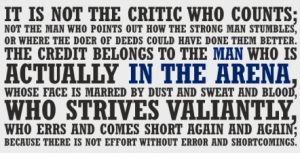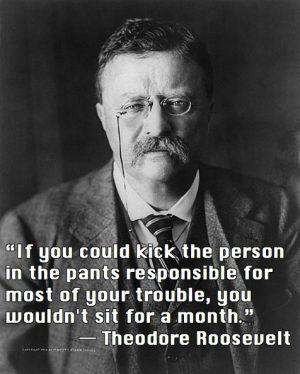 You want the good life… Creating the good life, health, wealth, love and happiness, will require creativity from you… ((This is the biggest difference between the age of The American Dream and today… then some work was enough… today just work is not enough.))
You want the good life… Creating the good life, health, wealth, love and happiness, will require creativity from you… ((This is the biggest difference between the age of The American Dream and today… then some work was enough… today just work is not enough.))
The opposite of creativity is timidness. ((And cowardice, and complacency, and having your hand out, and hoping that other people will do it for you. Am I describing you?))
Creativity is living at risk… Existential courage. ((Existential Courage
The antidote to the comfortable coma
The other day I stumbled across an ad for a workshop helping you to release your intuition. It used the standard approach to selling these sort of New Age ideas: quotes from Einstein and Steve Jobs on the importance of intuition, vague promises of revealing secrets known only to the most successful and powerful, and an invitation to “let your life be easier.”
It reminded me of a quote from Barbara Ehrenreich in Bright-sided, her critique of the positive thinking craze. She says “positive thinking is not the same as existential courage.” This might be the most important distinction we can make these days. We are constantly bombarded with messages from advertisers trying to sell us on the idea that our lives should be comfortable and easy. Eventually, we start to believe them. We start to see hard work as a sign of failure and discomfort as a psychological illness. Even our understanding of spirituality is being corrupted by misconceptions of enlightenment as some sort of personal accomplishment marked by perpetual bliss.
As a result, we have become unbalanced, individually and as a society. Sure, comfort and ease play a role in a life well-lived: we need hedonic pleasure and moments of pure enjoyment. But focusing almost exclusively on this kind of comfort addiction leaves us with a sort of existential hangover and a void that’s impossible to fill – a void that advertisers promise to fill with anything they can sell you.
Existential courage is absolutely necessary if we are ever to find a way out of this addictive cycle. The roots of the word courage actually come from the French coeur, or heart. It was believed that acts of valor and bravery could only be inspired by connecting to something larger than oneself. And here’s the twist, because that connection, rather than comforting, often confronts. It highlights our fragility. It points out how small and insignificant we are. That thing that we connect to calls into question the ego-self and creates what Pema Chodron calls the vulnerable heart. It forces us to confront our own demons and ask if “I prefer to grow up and relate to life directly, or do I choose to live and die in fear? ”
Existential courage is about connecting to life with a profound love and compassion that moves beyond Hallmark greeting cards and hollow Hollywood formula movies. It sees that oneness with the whole of creation also means oneness with the suffering and the shadow. It’s a love that sees everything with open eyes – the beauty and the self-imposed pain, the brilliant sparks and the enduring insanity of the beloved. It stands on the edge of mortality, never forgetting our fragility, but chooses to act in the here and now.
And it is this paradox that is at the core of existential courage – letting our vulnerability make us strong, letting our incompleteness make us whole, letting the impossibility of the task inspire action. It knows, as Gandhi said, that “what you can do is insignificant yet it is vitally important that you do it.” Acts of existential courage are rarely grandiose – that’s the ego’s idea of courage. Usually, they are small, humble things – things that require practically no real effort beyond the courage to actually do them.
So what is that one crazy little thing that you can do today? What makes you a little uncomfortable and threatens your belief that you’re in control? What is that awesome thing you can connect with that makes you aware of how small and incomplete you are? What is that one thing that probably won’t make a difference anyhow but feels vitally important?
Source: https://medium.com/@emotusoperandi/existential-courage-7b25c9358764#.3igjzf2sn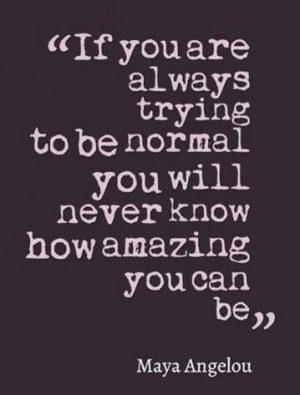 ))
))
You want to color inside the lines… and get the good life. No chance.
Unless you are willing to shuffle and stir things up, you are among the dead, you are among those timid souls that never know defeat, but never know success either.
It is not the critic who counts; not the man who points out how the strong man stumbled or where the doer of deeds could have done them better. The credit belongs to the man who is actually in the arena, whose face is marred by dust and sweat and blood; who strives valiantly; who errs and comes short again and again; who knows great enthusiasms, the great devotions; who spends himself in a worthy cause; who at the best, knows in the end the triumph of high achievement, and who, at the worst, if he fails, at least fails while DARING GREATLY so that his place shall never be with those timid souls who know neither victory or defeat. ~ Theodore Roosevelt
Why is that? Because coloring inside the lines, trying to be the best when playing by the prevailing rules, can only give you a life you didn’t choose, you didn’t design. All you can hope is that someone else will dig out the goodies for you… just like the Germans did in 1933.
Without courage, all you can do is decorate. Make the ugly, the boring, the un-impactful pretty.
Why is it mandatory for you to be creative if you want the good life?
In a world with seven billion people, you cannot be successful at anything by coloring inside the lines. By being timid.
Tai talks about the edge effect.
If you are an absolute genius in your field, you can, maybe, do well.
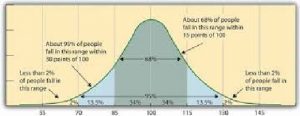 But very few people are on the far right side of the bell curve, in any area.
But very few people are on the far right side of the bell curve, in any area.
You may be good at your job at your particular workplace, but across the board? You probably aren’t.
I don’t have any students who are in that 5% range of humanity.
The edge effect is finding or creating a field that is so unusual, so not part of the coloring within the lines culture, that you, with your meager resources: talent, awareness, determination, work-ethic, etc. may make a life for yourself. A life that is better than the sum-total of the qualities you bring to it.
In my own life, I showed some talent in many areas: music, architecture, mathematics, but didn’t belong to the five percent.
My father did, but I didn’t. And neither did my brothers.
As an architect I specialized in designing building for steep hills… It was my attempt to use the edge effect. Very few people dare to go there… it’s not an easy task, and there are not many steep hillsides that can be built.
In Landmark I specialized in coaching people who were still struggling with the remnants of incest: not a pleasant topic, and not an easy task to return these people to happiness.
I also specialized in coaching introduction leaders about their emotional blockages, their posture, etc. I could do it over the phone…
I had the edge effect.
In publishing I went to the edge of bringing education, compassion, a woman’s perspective to an area that is traditionally a man’s pleasure. Edge effect.
In personal development I am bringing the perspective of Tree of life v. Tree of Knowledge. I am bringing my finely honed ability of distinguishing, recognizing emotions, and my connection to Source.
Edge effect.
When someone asks me what I do for a living… I don’t have one answer. I have ten… When you work on the edge… there is no box that you fit it. That is what gives you the edge.
The word, the expression “edge effect” is a term in ecology: https://en.wikipedia.org/wiki/Edge_effects In ecology, edge effects refer to the changes in population or community structures that occur at the boundary of two habitats. Areas with small habitat fragments exhibit especially pronounced edge effects that may extend throughout the range. As the edge effects increase, the boundary habitat allows for greater biodiversity.
The edge is neither water, nor dry land. It is neither forest nor meadow. It is neither a desert nor an oasis… it is on the edge of those… one foot in each.
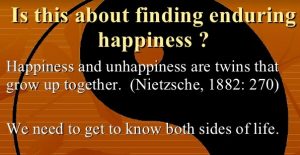 You can translate biodiversity to this: more people can thrive there… even people with less than perfect knowledge and skills.
You can translate biodiversity to this: more people can thrive there… even people with less than perfect knowledge and skills.
If you look at the bell curve, that is actually 97.5% of everyone… and although most everyone (68%) who was asked about their abilities, will say they are above average, most everyone is delusional about their own abilities.
Even being above average will not buy you the good life. Life actually doesn’t care about averages. Life rewards courage. Life rewards exceptional.
Given that in capacities and abilities you can’t compete, you need to compete in the edge effect… be more and more creative in finding unexploited edge effects.
When a course is written, a program is sold, a push-button software hits the market on making it big, it is already mainstream… and you will not win with it, unless you excel in your capacities and your abilities.
Most of you have only two to five intangible capacities. The people who can make those programs work have ten to thirty…
You have been wasting your time and your money trying to find something ready for yourself… but when something is ready, you are too poorly equipped to perform and make a living there.
I am writing this article because my students are not getting it… and they don’t even look for the edge effect.
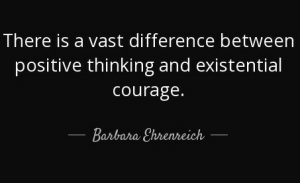 Why? Because to find and create a niche for yourself where you can shine requires courage and creativity. And looking, and recognizing.
Why? Because to find and create a niche for yourself where you can shine requires courage and creativity. And looking, and recognizing.
Capacities… you see where life is a series of Catch 22’s?
Tai has 10 intangible, spiritual capacities. Even 10 capacities open and active don’t put you into the top 2.5% of any field… With 10 capacities you still need the edge effect… so he chose to create it around the topic: mentoring, book learning, and principles learned through mentoring and reading.
No one else does that, so he created a niche that is not easy to break into. I have read a lot, but would never be able to match his ability to make it a business.
The moment you copy someone’s niche… you are not in the edge effect.
Is it difficult? Hell yes.
Do you need a lot of looking, talent, imagination, etc? Hell yes.
So how are you going to do it?
With guidance.
You see finding the edge effect for yourself is the hardest.
Even if you have talent… it is hard to see your own. You can be the best edge-finding coach in the world, you’ll need a coach to do you…
I have a process where I help find people integrate their life around what gives them juice in life.
I used to train three people to be able to do that work… We were all on a conference call, when we had a client.
One time we had no client, and they insisted that they do the process with me. Nah… I resisted, but then I relented.
The conversation, off the start, starting with the first question, went in a direction I would have not thought it would go… and it took us, reliably, firmly, unquestionably, to what give me and have always given me juice: Bringing the Divine to Everything.
Now that I know I can see it in all my history. And now that I can see it, I can and do organize my life to integrate it around it.
For example: my exercise class. You see, exercise can be mundane, repetitive, blah. But I bring the Divine to it, and it is a celebration, it is a party. Even when it hurts like hell… You can bring the divine to hurting… lol.
Does knowing what gives you juice help creating your niche, your edge effect?
Honestly, a lot of you has no juice, has no fun. So for you: no.
But if you can have serious fun (not ha-ha fun, but fulfilling experiences) then yes.
And until then: you may need to create your tap-root, your Sequoia root system…
Or you can continue subsisting in the tiny box you have been decorating all your life.
- -I am very picky who I work with.
- -I don’t take private coaching clients… I only coach inside my Reclaim structure, through the 67 steps process.
- -I do offer the Juice session to some people… it’s an hour long, and it’s at my regular rate $250.
- I do offer Health evaluation and coaching… because unless you are well, full of vitality and energy, you don’t have energy to have courage, or to be creative.
- -Through my 67 step coaching process I coach and support people
- —to find themselves
- —to develop and activate capacities that are needed for the good life: health, wealth, love and happiness
- —develop the edge effect where they can shine
- —prepare them to be their best even when life turns sour, or against them
- —become a full person, an expanding human being
The coaching conversations are in writing, and can be private if you wish. Or kept viewable for other coaching clients to learn from. Your choice.
They are private from the internet, always.
You need at least two hours a week to participate. No time? No problem. Don’t apply.
The cost? At present time it’s $15 a week. For that you get about an hour of my time each month… which means: you pay 20% of what you would pay if you talked to me… and get five times more results. 25 times what you pay…
You put in eight hours plus a month… The best students put in tens of hours…
You do the work, I just nudge you, spot you, or guide you.
Your results always come from what you do, and not the coach. Your work. Your insights. Your awareness.
Read the original article: Want the good life? Use the Edge effect. Finding your niche where you can win. living life creatively
